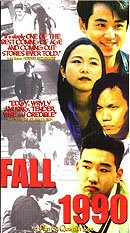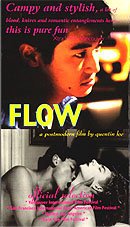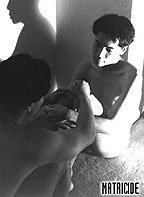|
|
|


 |
Fake.
Release year: 1996
Country: Japan
Gay cop hijinks abound in this
title based on the popular Japanese comic book! Dee Laytner
and Randy “Ryo” McLane are detectives in New York
City’s 27th Precinct. They go on vacation together
to England, where gay Dee plans on seducing Ryo. When
corpses start turning up outside their hotel, though, seduction
must be placed on the back burner until the mystery is solved!
 
|

|
|
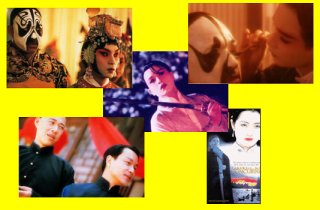 |
Farewell, My Concubine
Release year: 1993
Country: Hong Kong
The Peking Opera (as experienced
by two of its stars) is a metaphor for China's social and artistic
decline. The photography is stunning and the opera scenes and
Gong Li are beautiful to watch; Leslie Cheung is in fine form
as the perennial victim, and the odd friendship between Leslie
and the court eunuch is sensitive and even moving.
 
|

|
|
 |
Father Of The Bride
Release year: 1991
Country: USA
Sentimental family comedy about
father giving away daughter received lackluster critical response,
but was a huge commercial hit. Will please those looking for
light, Hollywood-style situational humor.

|

|
|
 |
Father Of The Bride II
Release year: 1995
Country: USA
Dad is reluctant to marry off
his daughter. Slapstick sequel was not heralded with much fanfare.
May prove amusing to romance or comedy lovers looking for some
mindless fun.

|
 |
|
|
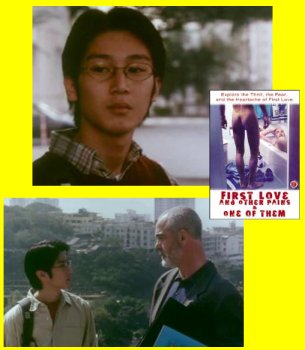
|
First Love and
Other Pains
Release year: 1995
Country: USA
In Hong Kong a nineteen year-old gay college student,
Mark, is smitten with his English instructor, an older, frustrated
British playwright, Hugh. Mark is a standout student in Hugh's
class and trails him to a theater where they are producing Hugh's
gay play. Mark strikes up a friendship with the depressed, alcoholic
- but well-preserved middle-aged man and they fuck in the bathtub
one drunken night. Hugh tries to push Mark away, but the youth
is persistent in his successful quest. The issue of an inter-generational
and cross-cultural romance is never even an issue, which certainly
makes watching the film nice and easy! Although the film has
a simple - and often told - story line, the film succeeds because
of the excellent actors and strong character development. (Partly
in Cantonese with English subtitles)
  
|
 |
|
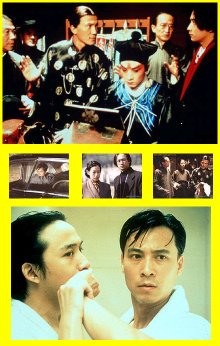
|
Fleeing By Night
Release year: 2002
Country: China
Filmed in Beijing and New York, FLEEING BY NIGHT tells the
story of Shaodung, an American-educated cellist who returns
to China for his arranged marriage to Ing'er the daughter of
a wealthy opera house owner. Once back home, however, Shaodung
finds himself drawn to singer Lin Chun, whose impassioned rendition
of the opera "Lin Chun Flees By Night" strikes a deep
chord in both him and his fiancée. The three become friends,
with Ing'er unaware of the deeper attraction between the men.
Unfortunately Chun is trapped in servitude to the master of
the company, who pimps him out to a rich playboy, and Shaodung
is deeply closeted, which hinders him from acting on his desires.
Set primarily in the late 1930s (but ultimately spanning decades),
the film effectively uses China's pre-revolution cultural contrasts
to parallel its characters' own identity crises. Homoerotic
content is fairly minimal in the film, which focuses more on
rich period detail and how the joys and sorrows of love can
shape the course of personal histories.
  
|
 |
|
|
Fall 1990
Release year: 1990
Country: USA
Fall 1990 is a college boy-meets-boy
romance; and finally, the structural glue holding this
operatic together is a witty mock autobiography of an aspiring
independent filmmaker with a love of rice boys and film.
In a delightfully freewheeling and campy manner, FLOW depicts
the experiences of a gay Asian filmmaker coming to terms with
his work, his mother and sexuality.
  
|
 |
|
|
|
Flow
Release year: 1995
Country: USA
Quentin
Lee combines five short films into his first feature that he
describes as "an allegory of the fictive history of gay
Asian films." It opens with an introduction to a 22-year-old
queer Asian filmmaker who is looking for love while trying to
finish his latest work, a character not unlike Lee himself.
What follows is a mix of autobiography and fiction, including
a parody of a safer sex public announcement, a knife-wielding
drag queen, a film noir about a young man that kills his mother
on Christmas Day, a surrealistic vampire tale and a story of
romance on the college campus. Lee successfully fuses together
fact with fantasy, a diversity of genre, and queer and Asian
identities in this celebratory work.
|
|
 |
 |
Fujimi Orchestra
Release year:
Country: Japan
Fujimi Symphony Orchestra is composed of amateur musicians
led by the shy, bespectacled Yuki Morimura. They didn't have
much to offer in terms of musical ability, but the arrival
of the brilliant conductor Kei Tounoin brings a newfound sparkle
in everybody's eyes. Kei is night to Yuki's day. While Yuki
leads with warmth and gentleness, Kei rules with a dictator's
hand. Despite this stark difference, Fujimi Orchestra blossoms
more under Kei's care. When all the young women, including
Yuki's love interest Kawashima, starts expressing romantic
interests in Kei, Yuki turns bitter. His performance plummets,
forcing an inevitable confrontation with the enigmatic Kei.
Yuki quits. Kei wouldn't allow it…for Yuki is the "violin"
that Kei had been longing for since the very beginning. This
title has no science fiction, no magic, no comedy, just good
solid drama about everyday people in their everyday lives.
It also features what appears to be the single longest sex
scene of all hardcore yaoi anime.
|
|
 |

|
Full Contact
Release year: 1992
Country: Hong Kong
Chow Yun Fat as
the villain! Robberies, double crosses, male-bonding. More
emphasis on sex than in most mainstream HK films.
Chow Yun-Fat pulls
off a caper with dainty but dangerous Simon Yam, but a double-cross
is in the works. In the messy conflagration that follows,
Yam's boys machine-gun an innocent family to get at Chow,
leaving a teenage girl with disfiguring scars. Our hero escapes,
however, and vows revenge to get money for the victim.
 
|
|

|
|
|

|
FUNERAL PARADE OF ROSES
(BARA NO SORETSU)
Release year: 1969
Country: Japan
Described by film historian Amos
Vogel as a study in 'surrealist displacement' Funeral Parade
of Roses offers a giddy glimpse of gay and transvestite subculture
in Japan at the end of the 1960s. A film years ahead of its
time, in which Matsumoto (who later made Pandemonium) brought
together the underground, avant-garde tradition in which he
had participated, and a politicised, Brechtian approach to social
reality. Playfully colliding documentary and fiction within
and across scenes, and mixing the sexual revolution with the
primal myth of Oedipus, film historian
Noel Burch sees Mastumoto bringing 'maximum clarification to
the productive confrontation between Japanese culture and Western
materialist theories of representation.
|

|
|
 |
Fussy Ghost
Release year: 1993
Country: Hong Kong
An upwardly mobile gay man is
so perturbed by his murder that his spirit sticks around to
incriminate his killer.
|

|
|
We
hope you have found the Long Yang - Denver's
Queer
Asian Cinema
informative.
If you know of a film with a gay Asian character that is still
available to rent or buy, please drop us an e-mail and tell us
about it so we can add it to our list!
|
|
|










